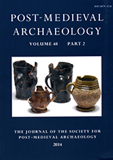
Post-Medieval Archaeology
Scope & Guideline
Fostering Scholarly Dialogue on Archaeological Discoveries
Introduction
Aims and Scopes
- Material Culture Studies:
The journal emphasizes the examination of artifacts and material remains to understand societal changes, everyday life, and cultural practices in post-medieval contexts. - Interdisciplinary Approaches:
By integrating methods from history, anthropology, and art history, the journal promotes a comprehensive understanding of post-medieval societies. - Regional Archaeology:
The journal often highlights specific geographical regions, such as Britain, the Baltic states, and the Americas, showcasing how local contexts shape broader historical narratives. - Social and Cultural Dynamics:
Research often explores themes of identity, migration, and community interactions, reflecting the complex social dynamics of post-medieval societies. - Archaeological Methodologies:
The journal promotes innovative fieldwork techniques and methodologies in excavation and analysis, enhancing the understanding of post-medieval archaeology.
Trending and Emerging
- Bioarchaeology and Health:
There is an increasing focus on bioarchaeological studies, particularly those examining health and disease in historical populations, reflecting contemporary concerns about public health. - Cultural Landscapes and Heritage:
Emerging themes include the study of cultural landscapes and their significance in heritage management, indicating a growing interest in the relationship between archaeology and contemporary identity. - Materiality and Identity:
Research exploring the connections between material culture and identity has gained traction, emphasizing how objects reflect and shape social identities in post-medieval societies. - Urban Archaeology:
The trend towards urban archaeology is evident, with a focus on the archaeological remains of cities and towns, highlighting urbanization processes and their social implications. - Interdisciplinary Collaborations:
There is a notable increase in interdisciplinary collaborations that merge archaeology with fields like environmental science, art history, and sociology, promoting a more holistic understanding of post-medieval contexts.
Declining or Waning
- Traditional Historical Narratives:
There is a noticeable reduction in studies focusing solely on traditional historical narratives, as the journal shifts towards more nuanced and interdisciplinary explorations of the post-medieval period. - Colonial Archaeology:
Research centered exclusively on colonial contexts has diminished, indicating a broader focus on local and indigenous perspectives rather than solely Eurocentric views. - Single Artifact Studies:
The journal appears to be moving away from papers that analyze single artifacts in isolation, favoring broader studies that consider material culture within its social context. - Static Interpretations of Sites:
There is less emphasis on static interpretations of archaeological sites, with a growing interest in dynamic and changing landscapes over time. - Narrow Temporal Focus:
Research covering very specific or narrow timeframes within the post-medieval period is less common, as the journal seeks to address broader temporal and thematic connections.
Similar Journals
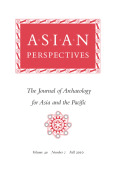
Asian Perspectives-The Journal of Archaeology for Asia and the Pacific
Exploring Diverse Narratives: The Heart of Asia and the PacificAsian Perspectives - The Journal of Archaeology for Asia and the Pacific is a prestigious journal published by University of Hawaii Press, focusing on the intricate field of archaeology in Asia and the Pacific. With a rich publication history dating back to 1993, the journal has established itself as a vital platform for disseminating research that illuminates the archaeological heritage and cultural dynamics of this diverse region. Recognized for its scholarly impact, it enjoys a commendable impact factor and ranks in the Q2 category for Anthropology and Archaeology, indicating its significant contribution to these fields. Although it operates on a traditional subscription-based model, the journal is accessible to institutional and individual subscribers worldwide. With an emphasis on interdisciplinary research, Asian Perspectives invites contributions that foster a deeper understanding of historical and contemporary issues through archaeology, making it an invaluable resource for researchers, professionals, and students alike committed to advancing scholarly dialogue in the region. Explore a wealth of innovative studies and insights that continue to shape the understanding of Asia and the Pacific's archaeological narrative.

Azania-Archaeological Research in Africa
Bridging the Past and Present of African Archaeology.Azania-Archaeological Research in Africa, published by Routledge Journals, Taylor & Francis Ltd, stands as a premier academic resource in the field of archaeology, specifically focusing on African archaeological research. With a remarkable tradition dating back to 1966, the journal spans over half a century of rigorous scholarship, aiming to enrich our understanding of Africa's diverse cultural and historical narratives. Currently indexed in the prestigious Q1 category for both Archaeology and Arts and Humanities, it ranks impressively in the Scopus database, placing within the top 12% of journals in its field. This commitment to excellence facilitates the dissemination of innovative and insightful research, catering to a broad audience of researchers, professionals, and students alike. While the journal is not open access, its impactful contributions continue to shape contemporary archaeological discourse, making it an essential resource for anyone passionate about the study of Africa's archaeological heritage.

Britannia
Connecting Scholars to the Rich Tapestry of HistoryBrittannia is a prestigious journal published by Cambridge University Press that serves as a cornerstone for scholars and enthusiasts in the fields of Archaeology, Classics, and History. With its ISSN of 0068-113X and E-ISSN of 1753-5352, the journal has been committed to disseminating high-quality research and innovative studies since its inception in 1970, addressing vital topics that span cultural, historical, and archaeological dimensions. As a hallmark of academic rigor, it maintains a Q1 ranking in Classics and History and a Q2 ranking in Archaeology (both Arts and Humanities, 2023), reflecting its impact and significance in these disciplines. Although not an Open Access journal, it provides invaluable content for researchers, professionals, and students alike, ensuring that vital insights into ancient civilizations and cultural heritage resonate well beyond the pages of each issue. With upcoming publications scheduled through 2024, Brittannia continues to be an essential resource for anyone invested in the legacies of the past.
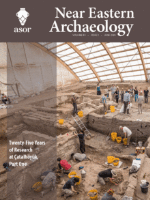
NEAR EASTERN ARCHAEOLOGY
Exploring the Rich Tapestry of Near Eastern HeritageNEAR EASTERN ARCHAEOLOGY, published by University of Chicago Press, is a premier journal dedicated to the field of archaeology, particularly focusing on the rich cultural heritage and archaeological findings of the Near East. With an ISSN of 1094-2076 and an E-ISSN of 2325-5404, this esteemed publication provides a vital platform for scholars and practitioners to share their research, insights, and discoveries. The journal holds an impressive ranking in the Q1 quartile for both Archaeology and History in 2023, reflecting its significant impact within these fields and a robust history of scholarly contribution. The journal has been pivotal in shaping discussions around archaeological methodology, theory, and contemporary issues from 2002 to 2024, as it continues to reach a wide audience through various access options. With Scopus rankings placing it in the top percentiles for both History and Archaeology, NEAR EASTERN ARCHAEOLOGY represents an essential resource for researchers, professionals, and students alike, fostering the exploration and understanding of the region's archaeological narrative.

Deltion of the Christian Archaeological Society
Advancing Scholarship in the Intersection of Archaeology and TheologyDeltion of the Christian Archaeological Society (ISSN: 1105-5758, E-ISSN: 2241-2190), published by the Christian Archaeological Society in Athens, Greece, stands as a pivotal source of scholarly work within the realm of Christian archaeology. This journal is dedicated to disseminating high-quality research that promotes the understanding of Christian history, heritage, and archaeological practices. Though it operates under traditional access options, it provides a comprehensive platform for researchers and professionals alike, fostering dialogue and collaboration within the archaeological community. With a commitment to advancing knowledge, the Deltion aims to support both established scholars and emerging voices, reinforcing the significance of archaeology in interpreting religious narratives and cultural contexts. Researchers, students, and professionals interested in the intersections of archaeology, history, and theology will find this journal an invaluable resource in their scholarly pursuits.

Pamatky Archeologicke
Unveiling the past with insightful research and critical discussions.Pamatky Archeologicke is a premier journal dedicated to the field of archaeology, published by the Academy of Sciences of the Czech Republic, Institute of Archaeology. Renowned for its rigorous scholarship and insightful contributions, the journal holds a distinguished position within the academic community, featured in the Q1 category of both archaeology and arts and humanities as of 2023. With impactful research articles that span a broad spectrum of archaeological inquiry, Pamatky Archeologicke serves as an essential resource for researchers, professionals, and students dedicated to understanding cultural heritage and archaeological methodologies. The journal enjoys a significant Scopus ranking, having achieved an impressive percentile ranking in both arts and humanities and social sciences disciplines. Although it currently does not offer open-access options, the journal remains committed to advancing the field of archaeology through high-quality research and critical discussions. Its scholarly contributions are crucial for fostering knowledge and innovation in the understanding of human history and prehistory.
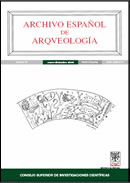
Archivo Espanol de Arqueologia
Pioneering archaeological scholarship for a global audience.Archivo Español de Arqueología is a prestigious journal published by the Consejo Superior de Investigaciones Científicas (CSIC), dedicated to the field of archaeology and the historical sciences. Since its transition to Open Access in 1991, this journal has been a significant resource for scholars and practitioners in Spain and beyond, ensuring the dissemination of high-quality research to a broad audience. With an impressive Scopus ranking that places it within the top 20% of journals in the disciplines of History and Archaeology, Archivo Español de Arqueología plays a crucial role in advancing academic discourse and promoting innovative archaeological methodologies. The journal has maintained rigorous standards, reflected in its placement within the Q2 and Q3 quartiles, enabling it to establish a reputation for excellence and reliability in archaeological scholarship. Researchers, professionals, and students are encouraged to explore the journal's diverse array of articles from its foundation year of 2009 to the present, enriching their understanding of the past through the latest findings and theoretical advancements in archaeology.
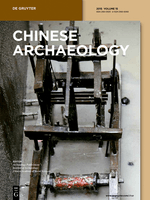
Chinese Archaeology
Charting New Territories in Eastern ArchaeologyChinese Archaeology, published by WALTER DE GRUYTER GMBH, is a leading journal dedicated to the exploration and study of China's rich archaeological heritage. With an ISSN of 2160-5025 and an E-ISSN of 2160-5068, this journal serves as an essential platform for scholars, researchers, and enthusiasts in the field of archaeology, offering a blend of original research articles, reviews, and critical essays that address both contemporary issues and historical narratives. While it currently operates under a conventional access model, making cutting-edge research available to a select audience, it plays a crucial role in advancing knowledge about China's archaeological sites, artifacts, and past civilizations. Given the increasing interest in Eastern archaeology and its significance in a global context, Chinese Archaeology is positioned as a pivotal resource for understanding and interpreting the complexities of China’s historical evolution. Researchers and academics are encouraged to contribute and engage with this vital field of study to foster greater insights and innovations.

Yorkshire Archaeological Journal
Pioneering Research in Yorkshire's Archaeological RealmYorkshire Archaeological Journal, published by Routledge Journals, Taylor & Francis Ltd, stands as a pivotal resource in the field of archaeology, particularly focused on the rich heritage and archaeological research within the Yorkshire region of the United Kingdom. With a dedicated ISSN of 0084-4276 and an E-ISSN of 2045-0664, this journal provides both researchers and practitioners valuable insights into archaeological discoveries, methodologies, and theoretical frameworks. While it holds a Q3 ranking in both Archaeology (Arts and Humanities) and Archaeology (Social Sciences), its contributions remain significant for advancing discussions and knowledge within the discipline. The journal's archival depth, converging from as early as 1980 and continuing robustly into 2024, showcases a commitment to fostering academic discourse and exploration of archaeological heritage. Although it does not currently offer open access, its rigorous peer-reviewed articles make it an essential reference for academics, professionals, and students alike who are eager to deepen their understanding of archaeology and its applications.

Fornvannen-Journal of Swedish Antiquarian Research
Fostering Dialogue on Sweden’s Archaeological LegacyFornvannen - Journal of Swedish Antiquarian Research is a distinguished peer-reviewed journal dedicated to advancing the field of antiquarian studies through rigorous research and scholarship. Published by the Royal Academy Letters, History & Antiquities in Sweden, this journal has been a cornerstone of archaeological and historical discourse since its inception in 1978. It currently holds an esteemed position in the Q3 category in both Archaeology and History as per the 2023 assessments, reflecting its commitment to promoting high-quality academic contributions. With an ISSN of 0015-7813 and an E-ISSN of 1404-9430, Fornvannen provides insights into Swedish antiquities and serves as a vital resource for researchers and scholars eager to explore the nuances of archaeological and historical findings. Although not an open-access journal, it offers a comprehensive platform for the dissemination of knowledge within the fields of arts and humanities. As it continues its journey from 2011 to 2024, Fornvannen remains pivotal in fostering scholarly dialogue and enhancing our understanding of Sweden’s rich historical tapestry.